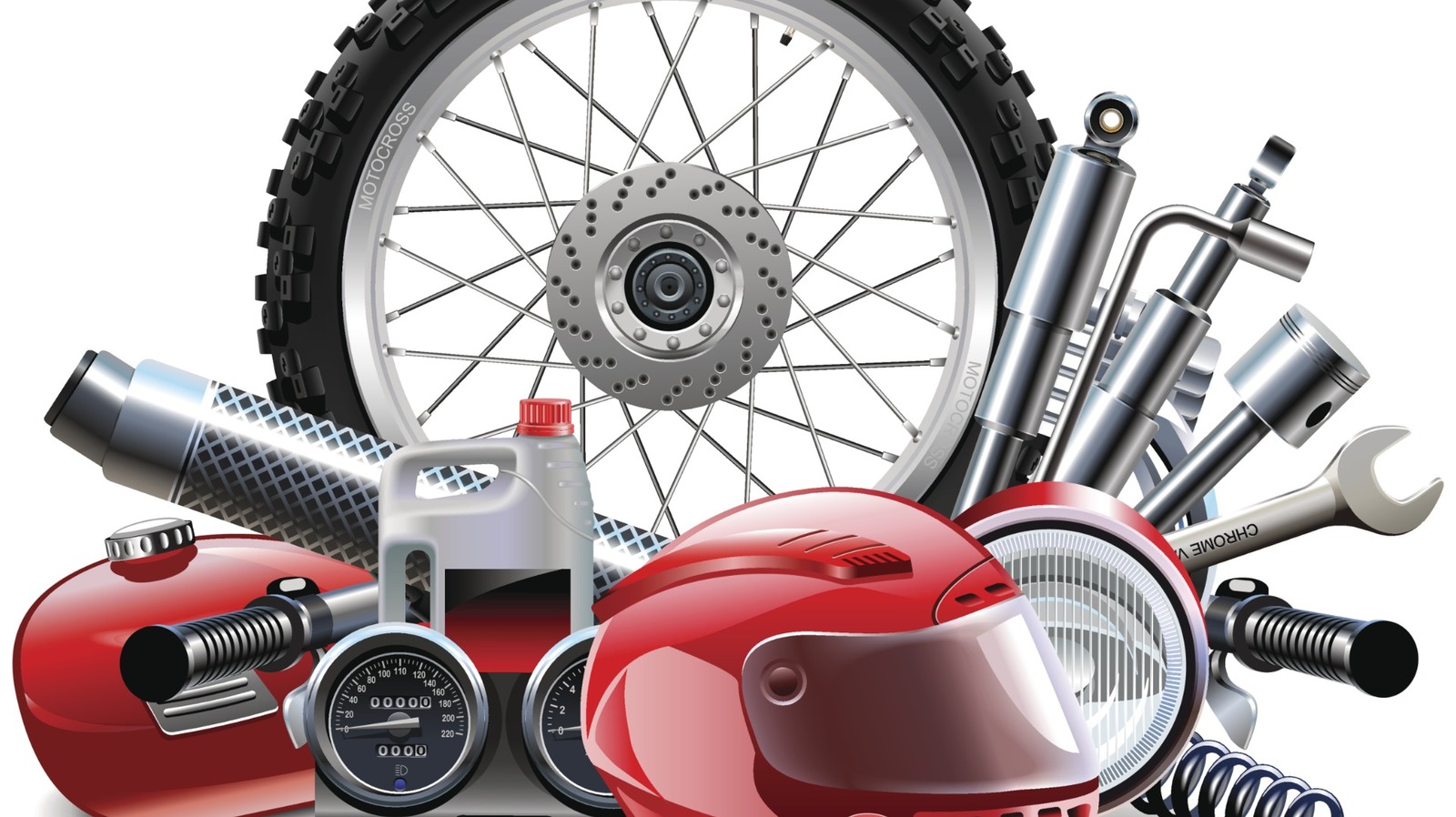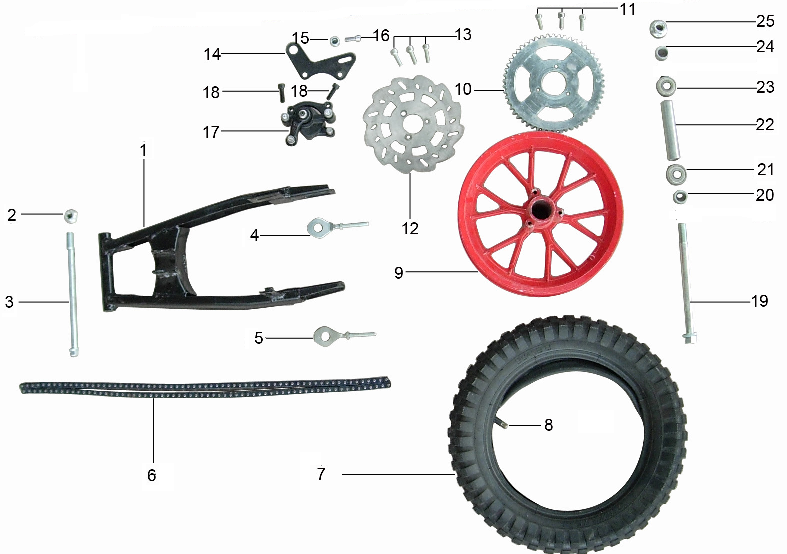Discover the Essential Motorcycle Parts You Required for Ideal Performance
Comprehending the important parts of a bike is fundamental for achieving peak performance. Each element, from the engine to the braking system, plays an important role in total functionality and security. Normal upkeep can protect against unanticipated failures and improve the riding experience. Several riders ignore the details of these systems. Finding just how they interact can lead to a more effective experience. What important elements should every rider prioritize?
The Engine: The Heart of Your Motorcycle
The engine serves as the core component of a bike, driving its performance and defining its capacities. It is accountable for transforming fuel into mechanical power, which powers the bike onward. Different sorts of engines are used, consisting of single-cylinder, V-twin, and inline configurations, each offering distinct characteristics fit for various riding functions and styles. The engine size, normally measured in cubic centimeters (cc), significantly influences performance, with bigger engines normally offering even more power and torque.Furthermore, the engine's layout and innovation, such as fuel shot systems or air-cooling versus liquid-cooling, affect performance and dependability. Maintenance is crucial for peak procedure; variables like regular oil adjustments and monitoring spark plugs assurance long life. Bikers frequently take into consideration an engine's responsiveness and smoothness, as these characteristics improve the general riding experience. Eventually, the engine continues to be a critical element that defines not just the bike's efficiency but additionally the rider's link to the equipment.
The Transmission: Changing Gears Smoothly
The transmission plays a vital function in a motorbike's performance, particularly in the auto mechanics of equipment moving. Recognizing exactly how to change gears smoothly can enhance the overall riding experience, while routine maintenance assurances peak performance. Proper focus to these facets can substantially impact the durability and efficiency of the motorbike.

Equipment Shifting Mechanics
Smooth gear moving is vital for ideal motorcycle efficiency, greatly influencing both acceleration and control. The technicians of gear moving entail the communication between the clutch, gear bar, and transmission system. When a cyclist involves the clutch, it disengages the engine from the transmission, permitting a gear adjustment without damaging the elements. A well-timed release of the clutch, combined with exact activity of the equipment lever, helps with a seamless modification between equipments. This process guarantees that the engine operates within its finest power band, improving performance. Oem Parts New Zealand. In addition, comprehending the gear ratios and their result on rate and torque can assist bikers make educated selections throughout shifts, ultimately adding to a much more receptive and delightful riding experience
Upkeep Tips Relevance
Regular maintenance plays an important role in assuring that the transmission system runs successfully, enabling smooth equipment changes. Routinely transforming the transmission and examining liquid is essential, as old liquid can cause increased rubbing and wear. In addition, evaluating the clutch for wear assurances peak interaction and disengagement, stopping slippage during equipment adjustments. Lubrication of moving parts is just as crucial to reduce rubbing and boost efficiency. Bike owners should also keep an eye on for leaks and uncommon sounds, as these can suggest underlying concerns. By adhering to these maintenance tips, cyclists can lengthen the lifespan of their transmission system, guaranteeing that equipment shifts continue to be seamless and adding to the general performance of their motorcycle.
The Braking System: Ensuring Safety on Every Experience
Braking systems are basic elements that straight influence a motorcycle's safety and performance. They are composed of different components, consisting of brake pads, blades, calipers, and hydraulic lines, all collaborating to assure efficient deceleration. The kind of braking system-- usually either disc or drum-- affects responsiveness and stopping power.Regular upkeep is necessary to promote peak performance; used brake pads can cause reduced performance and boosted quiting ranges. In addition, the quality of brake liquid should be monitored, as it can absorb moisture over time, jeopardizing stopping efficiency.Riders ought to additionally consider the value of anti-lock stopping systems (ABDOMINAL MUSCLE), which prevent wheel lockup during abrupt quits, improving overall safety. Correctly functioning brakes are not practically stopping; they infuse confidence in the rider, enabling for safer navigation through numerous surfaces. Inevitably, a dependable stopping system is vital for enjoying every experience with peace of mind.
The Suspension: Enhancing Comfort and Control
A well-functioning shock absorber substantially adds to a motorcycle's total performance, matching the efficiency of the braking system. The suspension plays a considerable role in soaking up shocks from uneven surface areas, assuring a smoother ride while preserving tire call with the roadway. This call is vital for both security and control, permitting cyclists to browse edges with confidence and precision.Different kinds of suspension systems, such as telescopic forks or mono-shocks, offer varying degrees of comfort and handling. Effectively tuned suspension boosts responsiveness, offering the rider with an extra connected feeling to the motorcycle. Regular upkeep checks are essential to ascertain the suspension elements, including dampers and springs, are functioning at their ideal. An efficient suspension system not only elevates the riding experience yet also contributes to the durability of various other motorcycle parts by lessening deterioration. Consequently, spending in top quality suspension is important for any major motorbike fanatic.
The Tires: Attaching You to the Roadway
Tires play a vital role in a motorcycle's performance, acting as the primary link in between the road and the biker. Understanding the different kinds of tires offered can considerably affect managing and safety. In addition, normal maintenance is important to ensure peak tire performance and durability.
Tire Keys In Explained
Just how do various tire types affect a motorbike's efficiency? Tire types play a crucial function in establishing a motorbike's handling, stability, and grip. Sporting activity tires, developed for high efficiency, deal boosted grip and responsiveness on paved roads, making them excellent for competing and hostile riding. Alternatively, touring tires focus on durability and convenience, supplying a smoother experience for long-distance traveling. Off-road tires, identified by their rugged walk patterns, master grip on unpaved surfaces, ideal for journey enthusiasts. In addition, dual-sport tires mix attributes from both on-road and off-road groups, dealing with functional riding demands. Inevitably, selecting the ideal tire type is necessary for optimizing efficiency, making sure safety, and improving the total riding experience.
Upkeep Tips Offered
While riding on the roadway, maintaining suitable tire condition is important for security and performance. Routinely checking tire pressure is vital, as under-inflated tires can cause bad handling and enhanced wear. It is a good idea to check step deepness frequently; worn tires concession grasp and stability. In addition, bikers should search for indications of damage, such as bulges or cracks, which can suggest the need for substitute. Turning tires regularly guarantees also put on, enhancing longevity. In addition, maintaining tires tidy from debris Resources and staying clear of extreme visuals can lengthen their lifespan. Ultimately, keeping proper placement and balance adds to come to a head efficiency, decreasing stress and anxiety on other bike components. Abiding by these upkeep tips will greatly enhance the total riding experience.
The Fuel System: Sustaining Efficiency and Effectiveness
The gas system plays a vital role in taking full advantage of a motorbike's performance and efficiency, as it ensures the optimum shipment of gas to the engine. It makes up a number of important elements, consisting of the gas container, gas pump, fuel filter, and gas injectors or carburetor. Each part has to operate efficiently to guarantee a smooth and powerful ride.The fuel container shops gas and provides it to the engine using the fuel pump, which creates the needed stress. A fuel filter avoids impurities from going into the engine, while the injectors or carburetor mix gas with air for combustion.Proper upkeep of the fuel system is important; a stopped up filter or malfunctioning injector can bring about lowered efficiency and increased fuel usage. By confirming that the fuel system operates efficiently, bikers can delight in improved throttle action, better gas economic situation, and generally enhanced riding experience.
The Electric System: Powering Your Ride
An effective electrical system is essential for the overall performance and safety and security of a motorcycle, as it powers critical components such as the ignition, lighting, and numerous electronic systems. This system includes the battery, which stores power, and the alternator, in charge of creating power while the engine runs. The wiring harness links these parts, guaranteeing reliable power distribution.Additionally, fuses shield the system from overloads, while relays assist manage high-current gadgets with low-power signals. A properly maintained electric system enhances efficiency by guaranteeing smooth begins and consistent procedure of lights and signals, vital for motorcyclist exposure and safety.Regular checks of the battery's cost and links are essential for avoiding electric failings. Motorcyclists should additionally inspect wiring for wear and tear, guaranteeing all parts operate ideally. Eventually, a robust electric system adds substantially to the total efficiency and dependability of the motorcycle.
Frequently Asked Inquiries
How Usually Should I Replace My Bike's Battery?
The frequency of motorcycle battery replacement depends upon usage and maintenance (Bike Parts Wellington). Usually, batteries need to be changed every three to 5 years. Normal checks can aid determine when a substitute is essential for peak performance
What Devices Do I Need for Standard Motorcycle Maintenance?
For standard motorcycle maintenance, one needs important devices such as an outlet collection, wrenches, screwdrivers, pliers, tire pressure scale, and a torque wrench. These tools assist in efficient upkeep and ensure the bike runs efficiently and securely.
Just How Can I Improve My Motorcycle's Aerodynamics?
To enhance bike aerodynamics, one ought to consider adjusting fairings, using windshield expansions, maximizing body placement, and minimizing general weight. These adjustments aid lessen drag, enhancing stability and gas efficiency throughout trips.
What Are the Indications of a Failing Electric System?
Indications of a stopping working electric system include lowering lights, problem starting, uneven tool readings, and blown merges. Motorcycle Parts Auckland. Uncommon smells or rust around battery terminals may also suggest underlying issues requiring prompt interest for safety and security and performance

Just how Do I Select the Right Oil for My Motorbike?
When choosing oil for a bike, one should consider the manufacturer's requirements, viscosity ratings, and the type of riding. In addition, artificial versus conventional oil can impact efficiency and engine security, influencing the decision look these up considerably. The engine size, usually determined in cubic centimeters (cc), substantially affects performance, with larger engines generally supplying even more power and torque.Furthermore, the engine's layout and innovation, such as gas injection systems or air-cooling versus liquid-cooling, impact efficiency and integrity. A well-functioning suspension system significantly adds to a motorcycle's general performance, matching the effectiveness of the stopping system. The fuel system plays an important duty in making best use of a motorcycle's efficiency directory and efficiency, as it guarantees the ideal shipment of gas to the engine. A gas filter avoids impurities from getting in the engine, while the injectors or carburetor mix gas with air for combustion.Proper upkeep of the gas system is vital; a blocked filter or malfunctioning injector can lead to decreased performance and increased fuel usage. A properly maintained electric system boosts efficiency by guaranteeing smooth beginnings and consistent operation of signals and lights, important for cyclist exposure and safety.Regular checks of the battery's charge and connections are vital for preventing electric failures.